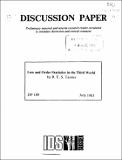| dc.contributor.author | Tanner, R.E.S. | |
| dc.date.accessioned | 2015-02-23T16:43:00Z | |
| dc.date.available | 2015-02-23T16:43:00Z | |
| dc.date.issued | 1983-07 | |
| dc.identifier.citation | Tanner, R.E.S. (1983) Law and Order Statistics in the Third World, IDS Discussion Paper 189, Brighton: IDS. | en |
| dc.identifier.uri | https://opendocs.ids.ac.uk/opendocs/handle/20.500.12413/5848 | |
| dc.description.abstract | This paper is about the unreliability of crime statistics in
developing countries. There are many operational, technical,
institutional, social and cultural reasons for these
inaccuracies. What the police do when an offence is reported and
whether they treat it as a crime is the most critical factor
determining the nature and extent of law and order records. Much
crime goes unreported because of distance, environmental
conditions, diffidence, fear of retribution and distrust or lack
of confidence in the police. Many other offences, though
reported, are never recorded because of incompetence, corruption
and an unwillingness on the part of the police to become
embroiled in domestic conflicts. And many crimes are not
considered as crimes because the offences relate to traditional
customs that form part of long accepted tribal and religious
codes of behaviour. At the same time minor infringements of the
law and petty contraventions are actively pursued by the police.
The resulting crime statistics thus provide a dubious and
inadequate basis for the formulation of policies of social
development and reform. | en |
| dc.language.iso | en | en |
| dc.publisher | IDS | en |
| dc.relation.ispartofseries | IDS Discussion Paper;189 | |
| dc.rights.uri | http://www.ids.ac.uk/files/dmfile/IDSOpenDocsStandardTermsOfUse.pdf | en |
| dc.subject | Governance | en |
| dc.title | Law and Order Statistics in the Third World | en |
| dc.type | IDS Discussion Paper | en |
| dc.rights.holder | Institute of Development Studies | en |
| dc.identifier.koha | 158960 | |

